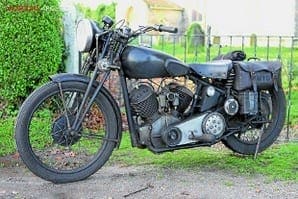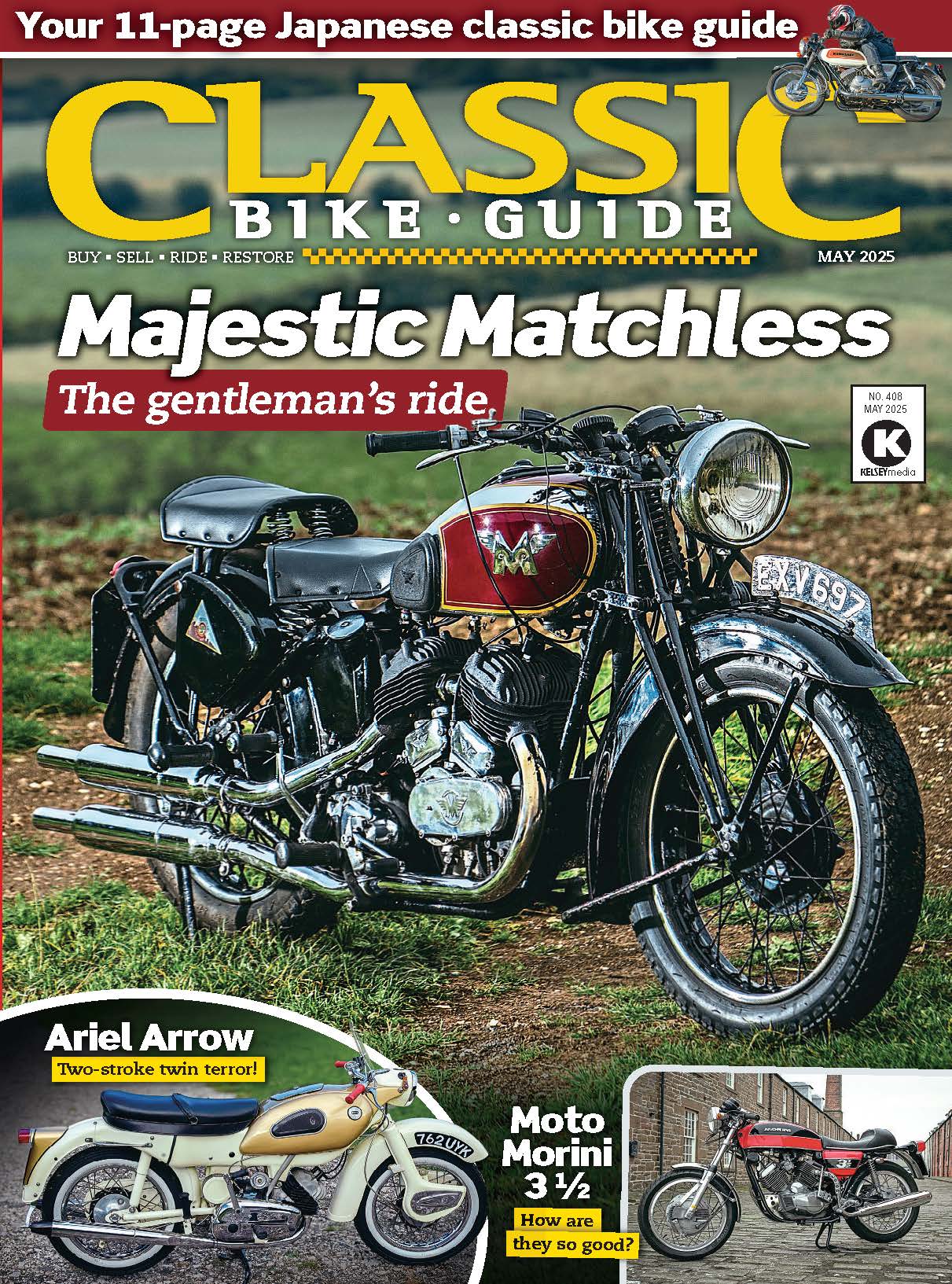
Warning: Please do not enter this riding for fun zone if you’re offended by a motorcycle built by an eccentric, looks like a backwoods collision between an agricultural unit and a military DR, sounds vaguely like a Gatling gun and doesn’t go at all fast.
The invitation to try this home-brewed, old fashioned cruiser came at a time when the country had a national debt of gazillions. Our once trusted bankers were telling us we’d have to tighten our belts and face up to rising costs, though they were sure we wouldn’t mind them getting their snouts in the trough again to the tune of more millions, for their bonuses. A personal medicine for that level of national sickness could just be a motorcycle that sticks two fingers up to the world of ‘I want it all for me and it must be as expensive as possible.’
 The offer came from Dave Wicks, proprietor of a bike shop in Dereham, Norfolk. He used to be a part-time archaeologist at the University of Norfolk, ran a Royal Enfield dealership from the back of a car showroom, did a bit of speedway riding and sold a lot of motorcycles at prices people could afford. “Fourth best selling dealer one year or two,” he’ll admit if you quiz him. Now operating from a smart unit on an estate, he’s not a suit, he greets you in his overalls.
The offer came from Dave Wicks, proprietor of a bike shop in Dereham, Norfolk. He used to be a part-time archaeologist at the University of Norfolk, ran a Royal Enfield dealership from the back of a car showroom, did a bit of speedway riding and sold a lot of motorcycles at prices people could afford. “Fourth best selling dealer one year or two,” he’ll admit if you quiz him. Now operating from a smart unit on an estate, he’s not a suit, he greets you in his overalls.
“I’ve got something I think you’ll love,” said Dave. “It’s an Ariel WNG despatch bike, fitted with an 1100cc side-valve JAP V-twin from a rotavator.” He had to explain it twice before I took in the description, but he’s a bloke you can trust and I knew it would be worth the journey. He’d also arranged for me to try two big classic Moto Guzzis, and the all-English special could be an interesting counterpoint.
So, on a chilly December morning I was on the forecourt of Dave’s shop, when there was a rumbling from down the road. It had to be the motorcycle, because a thunderstorm doesn’t back off, popping through the exhaust on the overrun and clattering its rear stand over the bumpy turn into the road. It was Neville Cushing, a man big enough to make the bike resemble a 125, cruising onto the park and heaving the bike onto the stand. He looks like Seasick Steve and has hands to match his size, evidence of his work as a steam engine mechanic at nearby Yaxham railway station, and a grip that reminded me I have arthritis in my digits. He has however, the amiable, friendly style of a man content with life and not given to aggro.
 His creation started with the old cast iron engine. It must have been a serious rotavator to include a lump like this in its specification, the sort of cultivator whose blades you could lower into the soil, open the throttle and plough non-stop across the county.
His creation started with the old cast iron engine. It must have been a serious rotavator to include a lump like this in its specification, the sort of cultivator whose blades you could lower into the soil, open the throttle and plough non-stop across the county.
The Ariel chassis Neville already had and Draganfly, in Suffolk, found him a set of the right girder front forks and matching 20in front wheel. Dave sourced the Ariel back wheel, a pair of second-hand mudguards that have been painted in keeping with the bike’s black livery and a Royal Enfield fuel tank. The main cradle of the frame had to be stretched a bit to accommodate the beefy motor, the top tube cut and a suitable insert brazed into place, the front engine plates modified and the steering head beefed up with a fabricated sheet steel brace: “Didn’t want to mess about with the malleable casting, that’s not stuff you play with,” explained Neville. Beneath the heavyweight Burman box the frame is further strengthened with a large brace, visible only if Neville lays the bike on its side.
 The engine originated with a single magneto, but to give better control of individual cylinder timing, Neville machined the timing cover and added a bevel gear to drive twin magnetos in the manner of the company’s racing engines, and fitted one mag’ per pot. There is no charging system, just a battery from a portable emergency starter kit tucked into a pannier. If that battery can persuade ailing trucks or tractors into life, it shouldn’t find life too stressing keeping the eight-inch headlamp glowing.
The engine originated with a single magneto, but to give better control of individual cylinder timing, Neville machined the timing cover and added a bevel gear to drive twin magnetos in the manner of the company’s racing engines, and fitted one mag’ per pot. There is no charging system, just a battery from a portable emergency starter kit tucked into a pannier. If that battery can persuade ailing trucks or tractors into life, it shouldn’t find life too stressing keeping the eight-inch headlamp glowing.
“The front brake is the correct six inch drum with inch wide shoes,” Neville explained. “Don’t work on the road, but it gets through the MoT. The rear’s good though and you’ve got a big V-twin slowing you down as well. Tickle it a bit as it’s cold, give it touch of throttle and it’ll start all right,” he instructed. It did, firing up with a healthy note from the two pipes feeding the home-made stainless steel Brooklands can. “I put a couple of holes in the bottom to make it sound more interesting,” the owner admitted. He’s right – Mr Volvo might not see it, but if he doesn’t hear it he really must be deaf.
 Photographer Wilkinson wanted a rural setting for his pictures and Dave suggested the road out of Yaxham for some interesting sweepers and the fine old Westfield church for the more romantic (Romantic! Huh!) static shots that would show off the bike in all its thoroughbred eccentric glory. With Neville guiding from the car, we headed out of the estate, the big JAP accelerating lustily with exhaust note to match. I love bikes that announce their presence, the sort that make people who understand turn their heads and grin.
Photographer Wilkinson wanted a rural setting for his pictures and Dave suggested the road out of Yaxham for some interesting sweepers and the fine old Westfield church for the more romantic (Romantic! Huh!) static shots that would show off the bike in all its thoroughbred eccentric glory. With Neville guiding from the car, we headed out of the estate, the big JAP accelerating lustily with exhaust note to match. I love bikes that announce their presence, the sort that make people who understand turn their heads and grin.
Once out of the 30mph limit, this one showed a willingness to reach a 50-ish mph cruising speed with an ease that belied its age, the Burman WB gearbox moving up through its four ratios with typical unhurried operation. You don’t play twinkle toes with these boxes, they don’t like that game, so you just ease the lever slowly through to the next gear and it selects firmly and silently. What you’d call dignified progress – until I realised that the clutch lever was waving around and not having any effect on the other end of the operation.
 Common sense said stop, but ahead the owner and his chauffeur were making a right turn and disappearing from view. I opted for the less than sensible clutchless riding option, lifting the gear lever into a false neutral and blipping before lifting it a little further and into second gear, while signalling a right turn and trying to time my arrival at the turning to coincide with a gap in the traffic. The engine seemed to be on the edge of stalling as the bike slipped right and steadily pulled away without murmur; it was a reminder of the joy of big old ‘woffly’ twins and their capacity to pull from tick over.
Common sense said stop, but ahead the owner and his chauffeur were making a right turn and disappearing from view. I opted for the less than sensible clutchless riding option, lifting the gear lever into a false neutral and blipping before lifting it a little further and into second gear, while signalling a right turn and trying to time my arrival at the turning to coincide with a gap in the traffic. The engine seemed to be on the edge of stalling as the bike slipped right and steadily pulled away without murmur; it was a reminder of the joy of big old ‘woffly’ twins and their capacity to pull from tick over.
Gently feeling through the gears with the box responding silently, I followed down the winding lane to the car stopped by the church. Repeat the down changing routine, slip into neutral as I braked next to Neville and showed him the problem. It was just the nipple slipping out of the operating lever at the gearbox, and a minute of fiddling had it back in place and the bike ready to operate normally.
In the riding sequence, which means back and forth down the road and around the chosen bend, there’s time to consider some of the details of this fascinating motorcycle – I refuse to call it a bike, because its constituent parts came from a time long before that word was in common use. The primary drive is a commercial toothed belt, the sort that comes in four tooth increments, so getting the tension right was a careful process, but it does its job smoothly and quietly, with minimal maintenance. The clutch is exposed, its body whirring round mighty close to the rider’s left boot, which Neville warned about. Not really necessary, because the moment your left heel rubs against the spinning outer plate you’re reminded to move your foot. Health and Safety? Sensible people just remember not to put their foot too close to the source of interesting vibration and eventual pain.
 It handles better than I expected, though the longish wheelbase means you have to choose your line through a bend before you get there and drive progressively through, the machine feeling lively but entirely predictable; flickable it isn’t. The rigid frame has no obvious effect upon road holding, even on a moderately bumpy lane, and let’s not forget the health benefit given by the absence of rear suspension, with its built-in exercise to keep your kidneys in good working order. Up at the sharp end, the girders move smoothly up and down with no trace of a clash; properly maintained girders do their job well, even if their action is no match for the later versions of decent telescopics.
It handles better than I expected, though the longish wheelbase means you have to choose your line through a bend before you get there and drive progressively through, the machine feeling lively but entirely predictable; flickable it isn’t. The rigid frame has no obvious effect upon road holding, even on a moderately bumpy lane, and let’s not forget the health benefit given by the absence of rear suspension, with its built-in exercise to keep your kidneys in good working order. Up at the sharp end, the girders move smoothly up and down with no trace of a clash; properly maintained girders do their job well, even if their action is no match for the later versions of decent telescopics.
The engine is a delight, pulling from low down with a rumble, its growing revs matching a descending noise scale. Nothing offensive to the likes of thee and me, you understand, just a reminder of a big, beefy old V-twin doing what the throttle asks of it with consummate ease. It runs up to 40 plus in third gear before the acceleration rate drops, at which point a measured change into top sees it lunging forward again. Alternatively, it will pull from 25mph in top, with no sign of a snatch from the transmission. Mr Prestwich’s humble side-valve confirms my long held opinion that a V-twin is the obvious and best engine layout for a motorcycle.
 In the conventional world, this just doesn’t stack up. An assortment of well used parts brought together and modified to accommodate an old fashioned agricultural engine. Concept-wise it’s bonkers. Just imagine putting that idea forward at a factory development meeting, you with this oddball thing and the consultant in the Armani suit doing his PowerPoint presentation of the latest trend on wheels. You’d be laughed at and thrown out; but if you were lucky enough to land in a place like Norfolk you’d find people who understood what you were after – plain and simple enjoyment. Ride a motorcycle like this – not that here are very many of them – and you want to relax and smile.
In the conventional world, this just doesn’t stack up. An assortment of well used parts brought together and modified to accommodate an old fashioned agricultural engine. Concept-wise it’s bonkers. Just imagine putting that idea forward at a factory development meeting, you with this oddball thing and the consultant in the Armani suit doing his PowerPoint presentation of the latest trend on wheels. You’d be laughed at and thrown out; but if you were lucky enough to land in a place like Norfolk you’d find people who understood what you were after – plain and simple enjoyment. Ride a motorcycle like this – not that here are very many of them – and you want to relax and smile.
Dave Wicks wanted me to go back next day and try his Moto Guzzi V7 demonstrator, and his bigger twin demonstrator-cum-own-bike, but when I arrived, there stood the Ariel-JAP again. Could I have another ride? “Do you really want to?” asked a surprised Neville. I’d driven through a lovely series of twisties the day before and I wanted to try this unique motorcycle through them, to have some time in the saddle with no distractions, just getting to know the machine a little better.
'At the other end, with an ear-to-ear grin on my face, I U-turned and repeated the experience, to enjoy it even more the second time. I was catching a sporty looking coupe in the process, and out on the straight he proved not to be in a hurry as we both cruised at 50mph'
Out on the road, with negligible traffic, the Ariel-JAP found its cruising sweet spot at about 50mph, the big engine purring smoothly while the chassis felt unhurried and the big pan saddle seemed to mould itself to my nethers. It swept through the long succession of bends in top gear, speed controlled almost completely by throttle movement with only a couple of dabs of the rear stopper necessary. At the other end, with an ear-to-ear grin on my face, I U-turned and repeated the experience, to enjoy it even more the second time. I was catching a sporty looking coupe in the process, and out on the straight he proved not to be in a hurry as we both cruised at 50mph.
 This is a motorcycle that makes you think. I neither know nor care what it cost to build, and any list of component costs won’t reflect the hours of skilled machining that Neville put into it. What is significant is a thoughtful blending of unlikely parts, with much experience and skill applied to their assembly, to produce a motorcycle that gave me a grin only surgery could have removed on the day. Six months ago, if you’d told me that I would find complete fun and enjoyment at 50mph in mid December on the chilly steppes of Norfolk I would have told you not to be so bloody daft – but I would have been wrong.
This is a motorcycle that makes you think. I neither know nor care what it cost to build, and any list of component costs won’t reflect the hours of skilled machining that Neville put into it. What is significant is a thoughtful blending of unlikely parts, with much experience and skill applied to their assembly, to produce a motorcycle that gave me a grin only surgery could have removed on the day. Six months ago, if you’d told me that I would find complete fun and enjoyment at 50mph in mid December on the chilly steppes of Norfolk I would have told you not to be so bloody daft – but I would have been wrong.
Enthusing to Dave Wicks about the amount of fun available at 50mph, he assured me that Neville gives it a rather energetic outing on occasions. “I’ve cruised with him at 65 and I reckon he’s done a bit more than that,” he recalled. So it’s a bit quicker than I thought, but this is not a performance motorcycle, it’s one man’s enthusiasm for the hobby expressed through his ability to make a comfortable silk purse out of an old sow’s ear.
Last word to Neville Cushing: “I call it the Rough Inferior.” Believe me, it is neither of those things. ![]()




